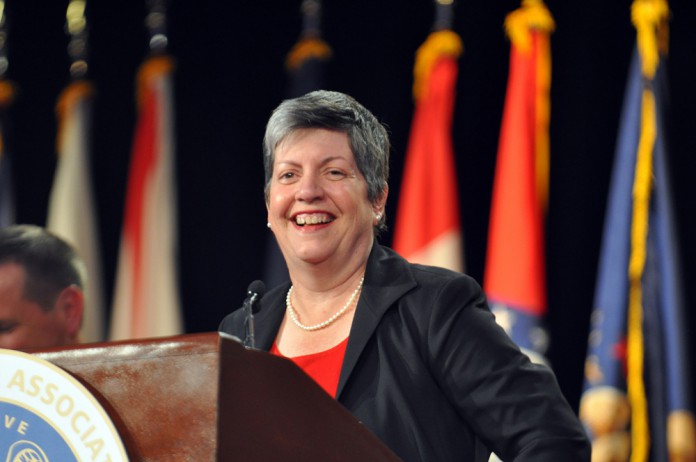
Anumita Kaur
The appointment of Janet Napolitano as the new University of California president has caused controversy and backlash across the state. During Napolitano’s time as the United States Secretary of Homeland Security, the U.S. experienced its largest number of deportations, with more than 1.5 million people being forced out of the country. Combine this with Napolitano’s lack of a background in education, and it makes sense that her appointment to head the UC system is widely contested by students across all the UC campuses.
University of California, Santa Barbara students took action themselves, authoring and sponsoring a resolution to both state their demands of the new president and to express their collective “no confidence” in her. However, Associated Students Senate voted down this resolution to the dismay of many students, including myself.
The appointment of Napolitano is not just an issue of who is able to fill the seat — she is now the face of a prestigious system. When this face has also been the architect behind mass deportations in recent years, we must be critical of the image and agenda she sets, as well as how it affects our communities of undocumented students.
Linda Gonzales, a third-year and political science major and co-chair of IDEAS, an on-campus group offering resources and support for undocumented students, feels that Napolitano’s appointment signifies the UC system’s very values.
“Is this what one of the greatest, most developed public school systems in the country has to offer its constituents? Is that what our Regents have to offer?” Gonzales said. “Appointing someone who stands for so much violence, separation, and pain; that’s what our school system validates apparently.”
Placing someone that represents this “violence, separation, and pain” at the head of our schools sends a direct statement, even if it is unintentional, to the communities of undocumented students on this campus, and the other UC campuses.
“Our tuition continues to rise, our scholarships continue to cover less and less of our charges,” Gonzalez said, “and now our own head of the UC, the person who is supposed to be the face of our population, is someone who has worked on devising ways to criminalize and deport us.”
In this way, our own campus, meant to be conducive to learning and activism, becomes a battleground of hostility and uncertainty.
UCSB students are not alone in feeling this way — various other UC campuses, including UC San Diego, UC Irvine, and UC Berkeley, have expressed the same concerns and passed similar bills in support of the undocumented community and in skepticism of Napolitano.
However, even with the passing of resolutions on other campuses, the UC has a long way to go.
If Napolitano is to be our UC President, we as students have a right to feel secure on our own campus, and we also have an obligation to support our marginalized peers.
In the following month, Napolitano is making rounds to all the UC campuses. She plans to have visited all the campuses, including our own campus, by late November. Her visit to the UCSB campus is our chance to let our voices be heard.
Photo Courtesy of Flickr User The National Guard










